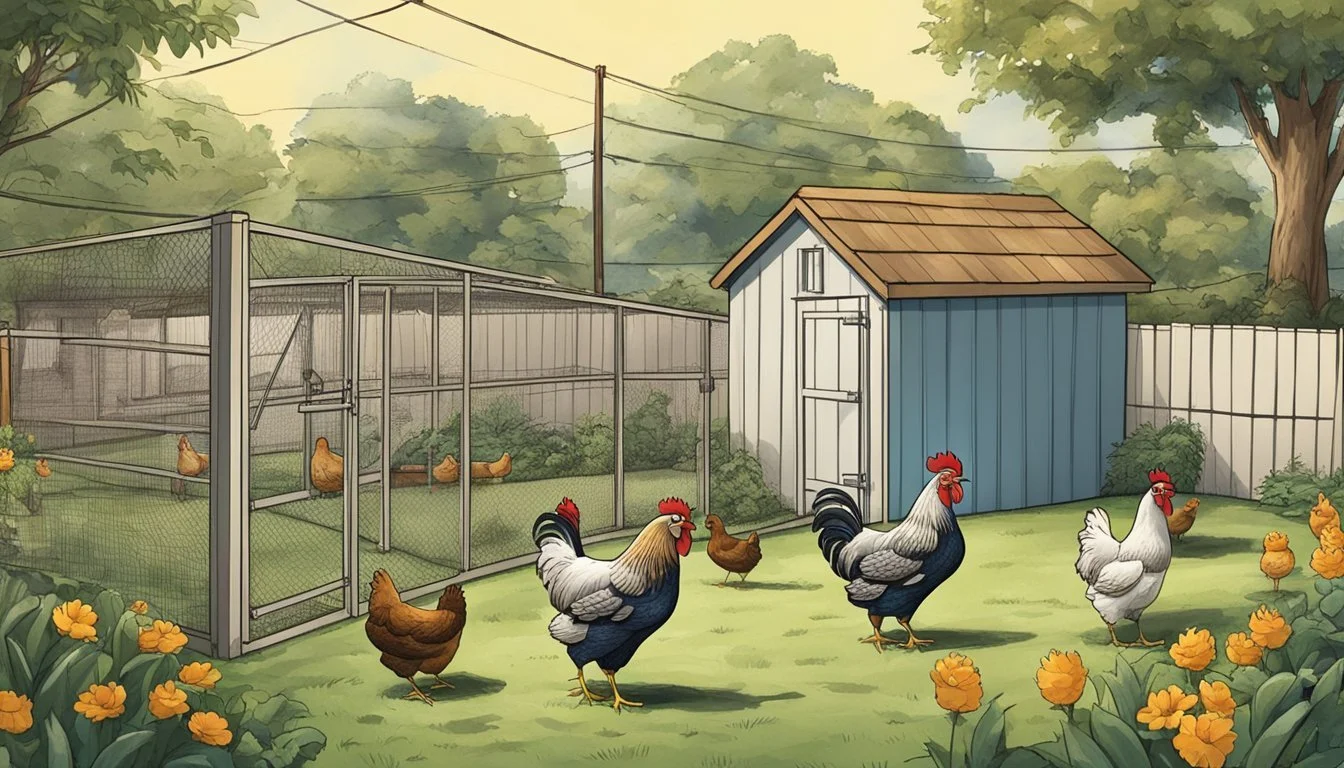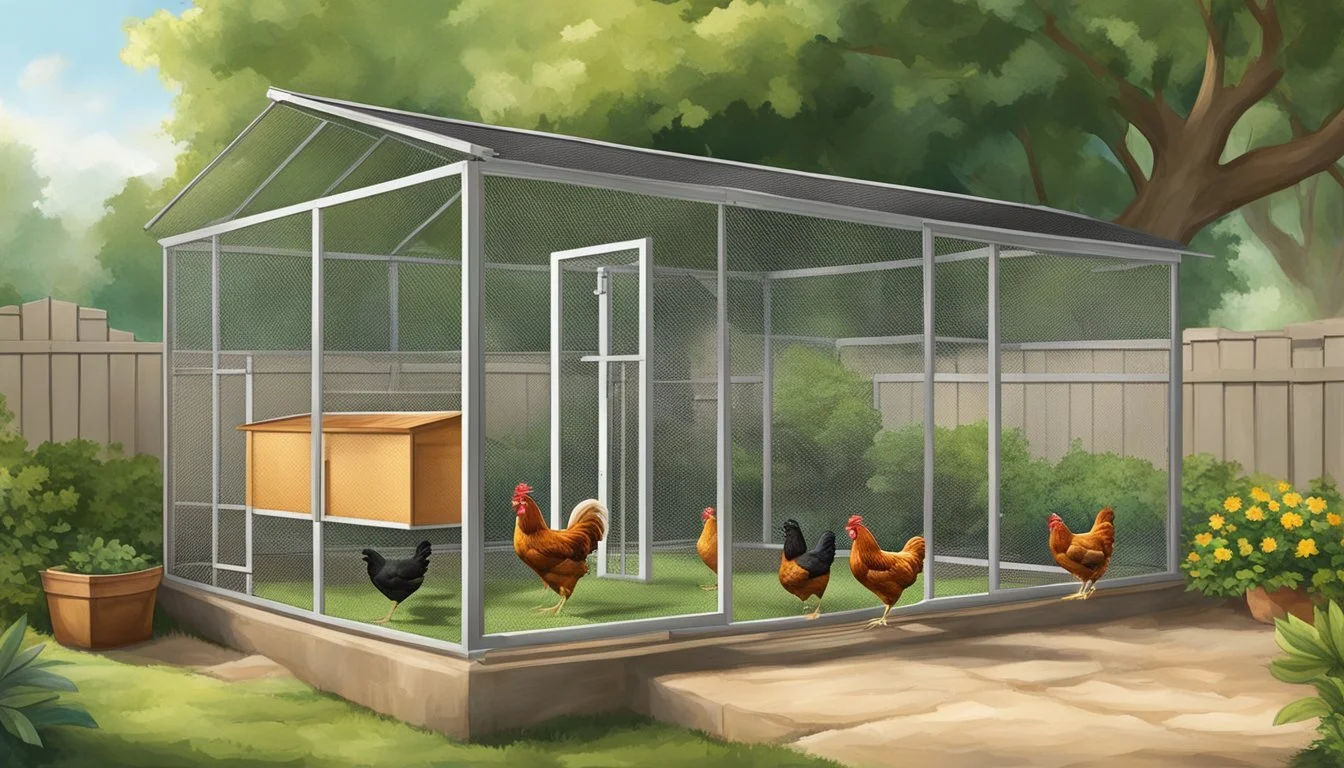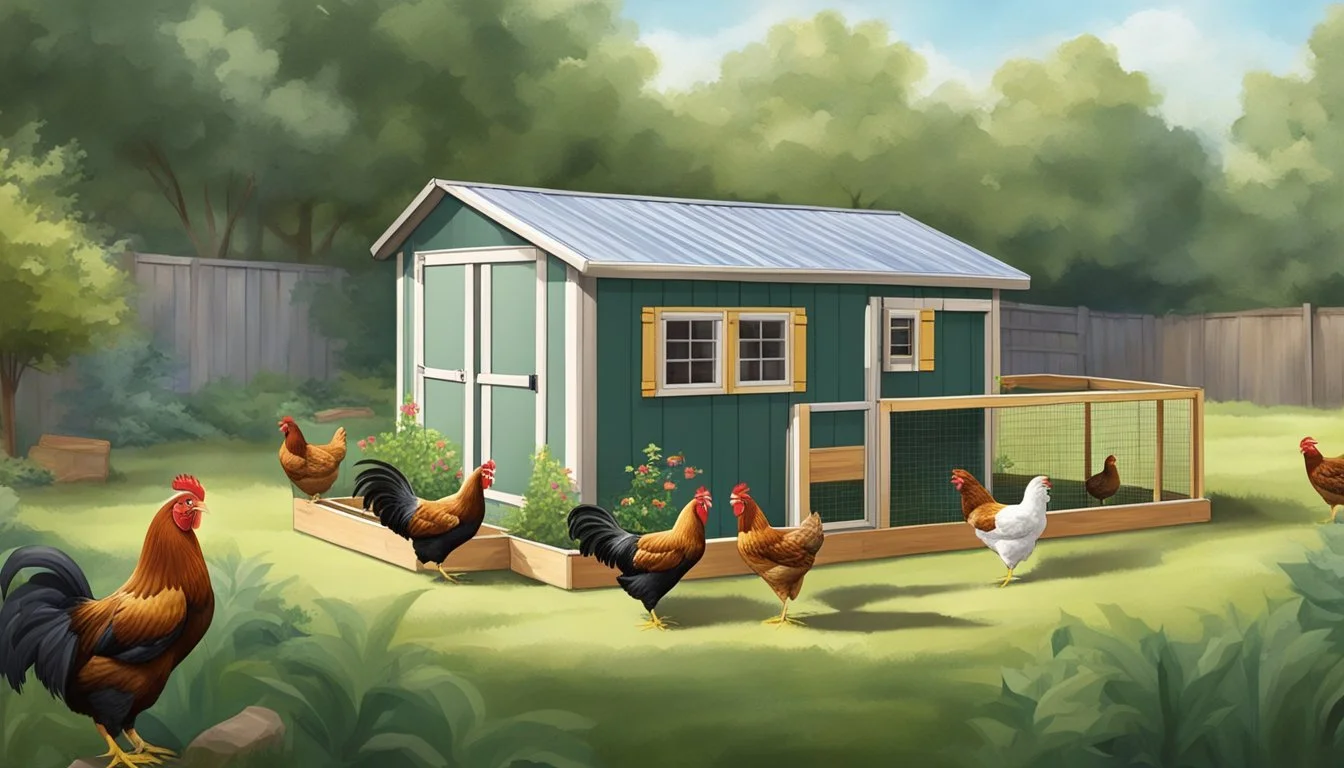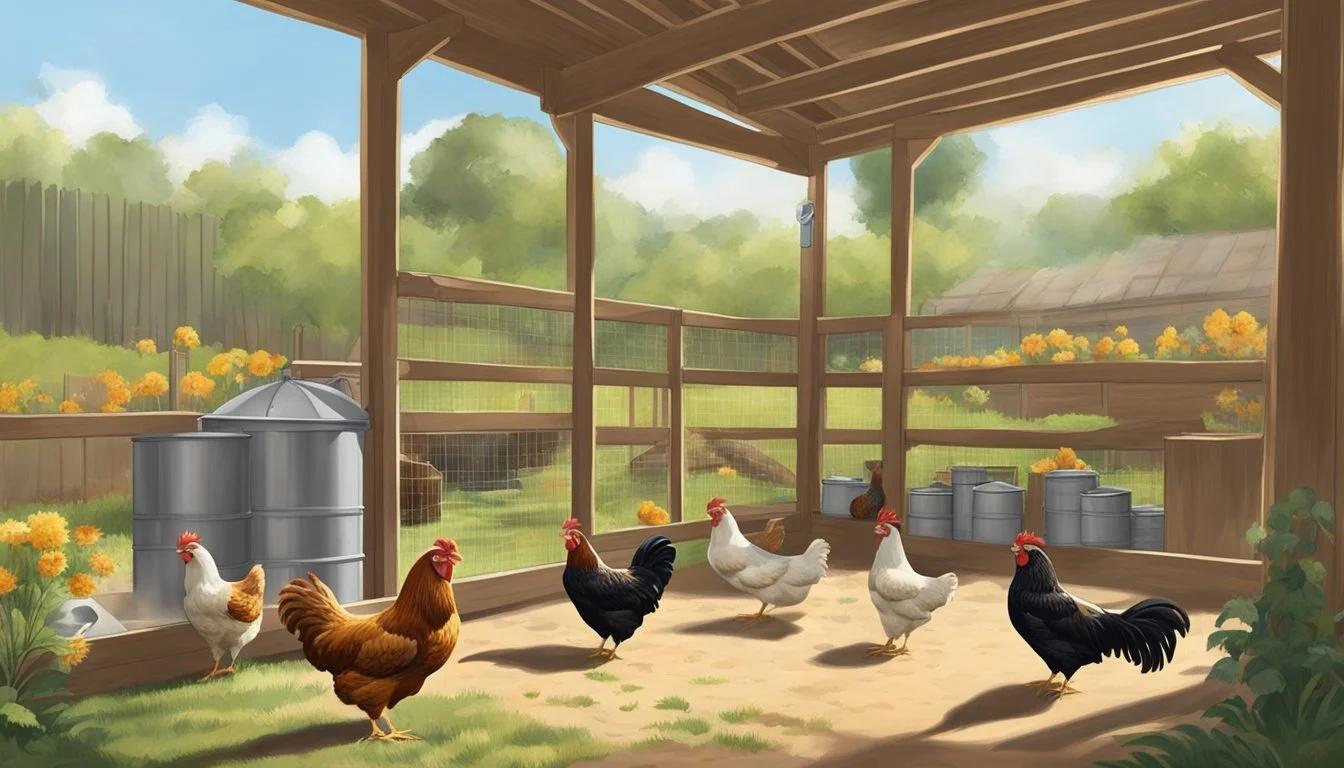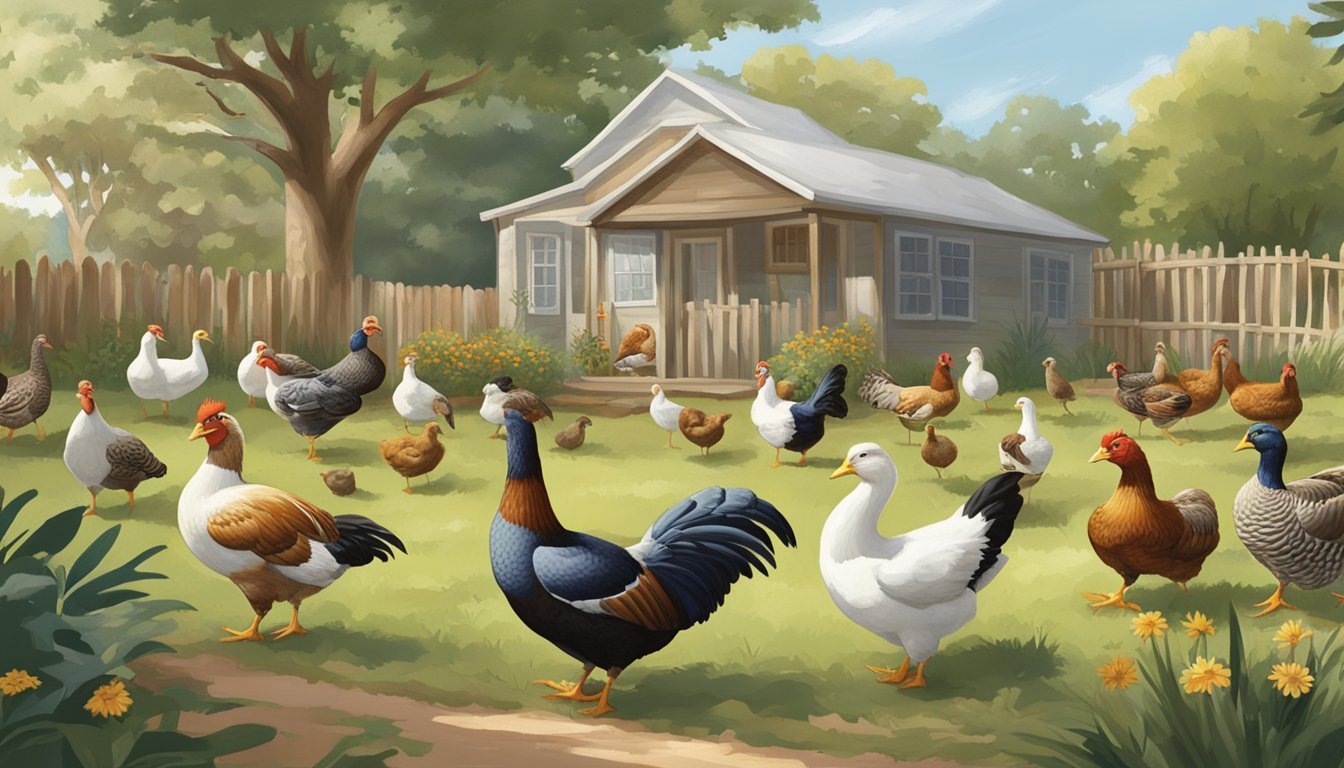Raising Backyard Chickens in Port Arthur, TX
Essential Tips for Beginners
Raising backyard chickens has become an increasingly popular hobby in Port Arthur, Texas, as residents discover the joys and benefits of keeping these birds as pets. With a small investment in a secure coop, basic supplies, and proper care, chicken enthusiasts in the region can enjoy a steady supply of fresh eggs, natural pest control, and the pleasure of tending to their own flock. Understanding the local regulations is an essential first step to ensure that this pastime is both legal and enjoyable.
In Port Arthur, like much of Texas, city ordinances must be checked to confirm that keeping backyard chickens is permitted. While Texas state laws do not directly regulate the keeping of backyard fowl, city ordinances can have specific guidelines that residents must adhere to, such as limitations on the number of hens and restrictions against owning roosters to minimize noise disturbances.
Prospective chicken owners should also consider the region's climate and potential predators when planning their chicken-raising venture. Proper shelter and protection from the elements are crucial for the birds' health and productivity. The endeavor not only adds a rural charm to Port Arthur's urban backyards but also fosters community through the sharing of resources and experiences among fellow poultry enthusiasts.
Understanding Local Regulations
Before starting a backyard chicken coop in Port Arthur, Texas, it is imperative for residents to familiarize themselves with the specific city and county regulations that apply. Compliance with these laws is essential to ensure the legality and sustainability of your backyard chicken keeping.
City Ordinances in Port Arthur
The city of Port Arthur enforces ordinances that dictate the keeping of backyard chickens. It is crucial for potential chicken owners to check with the City's Animal Control or Public Health Department for the latest ordinances, as they may specify:
Number of chickens allowed: This is often limited based on property size.
Permits: Whether a permit is required to keep chickens and any associated fees.
Enclosure regulations: Requirements for coop construction and maintenance.
County Laws and Zoning for Chicken Keeping
Although not immediately within the city limits, Jefferson County, which contains Port Arthur, has its own set of zoning laws that one must follow. These zoning laws impact:
Property lines: How close chickens and their coops can be to property boundaries.
Land use: The type of properties that can legally house chickens, whether residentially zoned, agricultural, etc.
Fines and penalties: For non-compliance with the county laws.
Distance from Schools, Churches, and Neighboring Residences
In addition to city and county laws, there may be specific regulations regarding the proximity of chicken coops to community spaces and neighbor's residences such as:
Schools and Churches: Local laws may require a certain distance from these establishments.
Neighboring Properties: There could be a specified minimum distance that coops should be set back from adjoining properties to minimize noise and odor impact on neighbors.
Residents of Port Arthur are advised to thoroughly review local laws and ordinances before proceeding with raising backyard chickens. This due diligence will not only help in adhering to regulatory standards but also promote good neighborly relations and ensure the welfare of the chickens being raised.
Selecting the Right Chicken Breeds
Selecting the appropriate chicken breeds for egg laying, meat production, and ease of care is vital for a sustainable backyard flock in Port Arthur, Texas.
Egg Laying and Meat Breeds
Leghorns and Rhode Island Reds are two reliable chicken breeds for Port Arthur residents interested in robust egg production. Leghorns are excellent layers, known for their capacity to produce a significant number of white eggs. They are hardy in a variety of climates and tend to be quite efficient for those focusing on egg laying. Their average egg count can reach up to 280 eggs per year. On the other hand, Rhode Island Reds are renowned for their brown eggs and dual-purpose nature, being good layers as well as providing ample meat.
When considering meat breeds, there are several options including the Cornish Cross, which is typically raised for its rapid growth and substantial meat yield. Meat breeds require a different feeding approach, often consuming more feed and gaining weight quickly.
Port Arthur's climate should be taken into account; local weather conditions and heat tolerance of each breed are important for ensuring the health and productivity of the chickens.
Breed Egg Color Purpose Egg Production per Year Leghorn White Egg Laying Up to 280 Rhode Island Red Brown Dual-purpose Approximately 250
Brooding and Care for Chicks
When raising chicks, one commences with a brooder, an enclosed space equipped with a heat source to maintain a warm environment for the baby chicks. Temperatures within the brooder should ideally start at around 95 degrees Fahrenheit and gradually decrease each week as the chicks develop feathers.
Starter feed is indispensable for the young chicks’ growth, providing the necessary nutrients tailored to the developmental needs of poultry in their early life stage. It's usually higher in protein than layer feed and ensures that the chicks get a strong start in life. Transitioning to layer feed is a key step as chicks mature into pullets and onset their egg-laying phase. The feed's nutrition must support egg production while maintaining the health of the chickens.
When selecting breeds for breeding, consider the ease of raising chicks, the breed's mothering abilities, and whether you will incubate eggs or allow hens to brood them naturally.
Baby chicks require attention and consistent monitoring to ensure their environment remains safe, clean, and conducive to growth. Any outbreak of illness could decimate a young flock, so sanitation and proper care are paramount for successful rearing.
By selecting the right breeds for your goals—be it for egg production, meat, or both—and providing diligent care for chicks, you can establish a thriving flock in Port Arthur, TX.
Designing Your Chicken Coop
When constructing a chicken coop in Port Arthur, TX, it's crucial to focus on ventilation, predator security, and space planning to ensure the health and safety of the chickens.
Ensuring Proper Ventilation and Insulation
Adequate ventilation is essential for maintaining air quality and temperature control within a chicken coop. In the humid climate of Port Arthur, TX, proper airflow prevents moisture buildup, which can lead to respiratory issues and bacterial growth. Strategically placed vents or windows on opposite walls facilitate cross-ventilation. Insulation is also key, as it helps stabilize the internal temperature during extreme weather.
Ventilation and Insulation Tips:
Install adjustable vents at the top and bottom of coop walls.
Use moisture-resistant insulation materials.
Ensure that openings are protected with hardware cloth to keep pests out.
Security Against Predators and Pests
Protection is paramount, as Port Arthur is home to a variety of predators such as raccoons, snakes, and birds of prey. The coop must be fortified to prevent any unwelcome intrusions. This includes sturdy walls, secure latches, and a foundation that extends underground to deter digging predators.
Security Features:
Use heavy-gauge wire mesh for windows.
Install predator-proof locks on doors and nests.
Regularly inspect for signs of attempted entry or weaknesses.
Coop Size and Nesting Box Arrangement
The coop size should accommodate the number of chickens with enough space to move comfortably. Typically, each chicken requires at least 2-3 square feet inside the coop and 8-10 square feet in the chicken run. Nesting boxes provide a safe space for hens to lay eggs and should be accessible for easy collection.
Layout Specifications:
Provide a minimum of one nesting box for every three hens.
Place nesting boxes in a quiet, darker area of the coop.
Ensure the chicken run is spacious for exercise and foraging.
By adhering to these considerations, one can create a functional and secure chicken coop in Port Arthur, TX that caters to both the physical and psychological well-being of backyard chickens.
Chicken Healthcare and Nutrition
In Port Arthur, TX, maintaining the wellbeing of backyard chickens hinges on accurate disease prevention and high-quality nutrition. The local climate and resources dictate specific healthcare practices and dietary needs for optimal chicken health.
Preventing and Treating Diseases
Backyard chickens in Port Arthur must be monitored closely for signs of illness, as early detection greatly improves treatment outcomes. Common diseases include respiratory infections and parasites, which can be combated through vaccinations and regular deworming schedules. Providing clean, dry, and well-ventilated living conditions is essential in preventing the spread of diseases. It's also crucial to separate sick birds from the flock to prevent contagion.
Vaccinations: Essential for preventing viral diseases.
Deworming: Should be done regularly, following a vet's advice.
Clean Coop: A preventive measure to decrease disease risk.
Feeding: From Starter to Layer Feed
The dietary requirements of chickens evolve from the time they are chicks to when they mature into layers. Initially, chicks require starter feed high in protein to support their rapid growth. As chickens mature, they transition to layer feed that has the right balance of protein, usually around 16-18%, to support egg production. In Port Arthur's climate, ensuring that food is not moist or moldy is particularly important.
Starter Feed: High in protein for chick growth.
Layer Feed: Balanced protein content to support egg production.
Supplements and Grit
Alongside their primary diet, chickens benefit from supplements such as calcium, to strengthen eggshells – often provided via oyster shells. Grit is also indispensable for digestion, as it helps break down food in the gizzard since chickens do not have teeth. Both oyster shells and grit should be readily available to chickens at all times.
Calcium Supplement: Often provided as oyster shells, crucial for strong eggshells.
Grit: Important for digestion, should always be accessible.
The Daily Management of Your Flock
Effective daily management is essential for the health and productivity of a backyard flock in Port Arthur, Texas. It involves establishing regular feeding, cleaning, and interaction routines that accommodate the specific needs of your chickens.
Feeding Routines and Water Supply
A chicken's feed and water supply are pivotal for its growth and well-being. They should have access to a balanced diet rich in nutrients. Feeders should be refilled daily with an appropriate food source, ensuring that it is fresh and free from mold or pests. The number of feeders and the amount of food provided should be proportional to the flock size to avoid competition that could lead to stress or injury.
Water containers must be checked and refilled multiple times a day, especially in hot weather, to prevent dehydration. The water should always be clean, so containers must be cleaned regularly to prevent the growth of algae and the spread of diseases.
Feeding
Refill feeders daily
Balance diet according to the number of chickens
Water
Check and refill water containers multiple times a day
Clean containers to maintain sanitation
Cleaning and Waste Disposal
Sanitation is critical to prevent disease and keep your chickens healthy. The coop and run should be cleaned to remove waste, leftover food, and feathers. This not only maintains hygiene but also helps control pests and vermin. Bedding should be frequently replaced or refreshed, depending on the type employed and the number of chickens in the flock.
Cleaning Tasks
Daily removal of waste and leftover food
Interacting with Your Flock
Regular interaction with your backyard flock helps monitor their health and tames the chickens for easier handling. Spend time observing their behavior; it's a good indicator of their well-being. Handling the birds should be done calmly and confidently to minimize stress. Direct interaction also provides an opportunity for a daily health check to spot any issues early on.
Interaction Guidelines
Observe behavior for signs of stress or illness
Handle chickens with care to build trust and ease of management
By adhering to these straightforward management practices, those raising chickens can ensure their backyard flock thrives in a safe and nurturing environment.
Community Relations and Legal Considerations
Raising backyard chickens in Port Arthur, TX involves understanding and adhering to specific regulations that foster good community relations and ensure legal compliance. Homeowners must navigate local ordinances that pertain to the management of noise and odors, as well as the potential legal consequences of non-compliance.
Managing Noise and Odors
In Port Arthur, homeowners must mitigate common issues such as noise and odors that can affect their neighbors. Roosters are known for their early morning crowing, which may violate noise ordinances. As such, it is often advised to keep only hens. Practical measures for odor control involve:
Regular cleaning of the coop
Composting chicken manure properly
Maintaining a dry litter to reduce smell
These steps not only minimize odors but also promote a healthy environment for the chickens.
Legal Ramifications for Non-Compliance
Non-compliance with local ordinances can lead to legal repercussions. Residents of Port Arthur must be aware of and comply with the laws and regulations governing backyard chicken keeping, including:
Number of chickens allowed
Proximity of coops to neighboring houses
Restrictions on slaughtering of poultry
Failure to adhere to these regulations can result in:
Consequences Details Fines Monetary penalties for various ordinance violations Removal of chickens Mandatory rehoming of poultry if found in breach of laws Restrictions or prohibition Potential updated ordinances limiting or banning chicken-keeping
Homeowners should therefore obtain all information directly from the city in writing and ensure full compliance to avoid legal issues.
Beyond Chickens: Other Backyard Poultry
In addition to backyard chickens, enthusiasts in Port Arthur, TX might consider ducks, geese, and turkeys as alternative poultry options. Each species offers distinct advantages and requires specific care considerations.
Considering Ducks
Ducks are hardy birds that often adapt well to various climates and conditions. They are typically less susceptible to disease than chickens and can thrive in a backyard setting with a water source for swimming. Residents should note the following about ducks:
Diet: Similar to chickens but prefer more insects and aquatic plants
Shelter: Need protection from predators but can be less complex than chicken coops
Space Requirements: Adequate space for foraging and a water feature like a pond or kiddie pool
Geese
Geese, often valued for their watchdog capabilities, can be a great addition to a backyard flock. They require open spaces to graze and can be more aggressive than chickens or ducks. Key points about geese include:
Diet: Primarily grass-based; supplement with grains
Shelter: Simple shelters or protected areas for night-time; they are less susceptible to predators due to their size
Space Requirements: Larger areas for grazing and moving around
Turkeys
For those with more space, raising turkeys can be a rewarding venture. Turkeys need more food and space than chickens but can be raised for their meat or for breeding. Crucial considerations for turkeys are:
Diet: Higher protein feed especially during their growing period
Shelter: Sturdy housing to protect from weather and predators
Space Requirements: Ample space; they require more room than chickens to roam
Conclusion
Backyard chicken keeping in Port Arthur, TX provides residents with the possibility of a fresh and sustainable source of eggs. Adhering to local ordinances, homeowners can enjoy the pleasures and benefits of raising hens on their property. It is critical for potential chicken keepers to ensure their coops are secure to protect chickens from potential predators and to prevent them from becoming a nuisance to neighbors.
Given the necessary space for a healthy environment, individuals should provide at least 3 square feet inside the coop and 8-10 square feet in the run per chicken. Property size in Port Arthur will influence the number of chickens one can feasibly keep while maintaining a manageable coop.
Lastly, regular maintenance of the coop is essential to minimize odors and maintain hygienic conditions, both for the chickens and the people living nearby. By doing so, the risk of zoonotic diseases is significantly reduced, ensuring that backyard chicken keeping remains a healthy and enjoyable activity.
Those interested should research local regulations thoroughly and consider their ability to commit to the responsibilities that come with raising chickens. With proper care and management, backyard chicken keeping can be a rewarding addition to a sustainable household.


